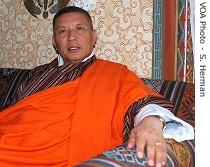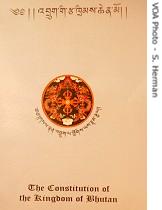2007年VOA标准英语-Bhutan's Prime Minister Confirms He Will Resign(在线收听)
Thimpu, Bhutan
18 July 2007
Bhutan's prime minister and six other members of his cabinet are set to resign within weeks. Prime Minister Khandu Wangchuk, in a VOA interview, confirmed the decision to step down so that he and others can be candidates in the Himalayan kingdom's first parliamentary elections. VOA's Steve Herman reports from Thimpu, the capital of Bhutan.
Bhutan's government is to be placed in the hands of a caretaker prime minister by early August following the expected resignation of most of the current cabinet.
 |
| Khandu Wangchuk |
"To join the political process it requires us to stand down from our present responsibilities because if we continue you would have what we call conflict of interest," he said. "It is not proper for us to continue our functions as ministers or even for myself, as prime minister, and yet undertake political activities."
The prime minister says the country's fledgling political parties have been struggling to find enough candidates to run in this year's Upper House and next year's Lower House elections. Mr. Wangchuk says he had hoped to leave government but feels compelled to help ensure the success of democracy in the small Himalayan kingdom.
The move from absolute monarchy to parliamentary democracy comes at the initiative of the former king, Jigme Singye Wangchuck, who has abdicated his throne. His son, Jigme Khesar Namgyel Wangchuck has taken over and will be formally crowned next year.
The prime minister acknowledges that the king's subjects are anxious about the devolution of power from the throne because they have been happy with rule by four generations of the Wangchuck dynasty.
"People fear, or are concerned, that the changes may not necessarily provide continuity in terms of the stability, the peace and prosperity that people have enjoyed," he said. "They have seen not so good examples in some young democracies, there is often instability. And instability leads to lack of development and other social and economic problems."
 |
| Bhutan's draft constitution |
Sandwiched between giants China and India, the Buddhist kingdom, although a member of the United Nations, has formal diplomatic relations with only a small number of countries.
Bhutan's foreign policy traditionally has been in the hands of India, but the two neighbors this year agreed that the kingdom will have a greater say in its own international affairs.
Prime Minister Wangchuk says he hopes Bhutan's neighbors and other countries will help ensure democracy in his nation succeeds. He says if Bhutan goes astray on its new path the consequences for the kingdom would be severe - a reference to states that have failed to make the transition from absolute rule to stable democratic governance.